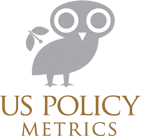
US Policy Metrics is an economic and public policy research firm serving asset managers, hedge funds and the investor community. We provide independent, strategic analysis of how current and proposed legislation and regulations affect the economy, industries and individual firms. We work with our clients to provide a customized insight into how government actions can impact their planning and strategy. Our services include ongoing monitoring of major issues and ad hoc, one-on-one discussions regarding specific items of interest.Our research does not rely on personal interaction with government officials, but on a thorough review of the public record, ongoing discussion with fellow experts who, like us, pay close attention to the public debate over key issues and our own analysis of the likelihood of potential outcomes. It is our experience that innovative, forward-looking strategic thinking and planning, based on focused research and analysis, produce superior results. Our deep knowledge of economics, government and the forces that shape decision-making in Washington allows us to identify the hidden obstacles and opportunities that others miss.
Steve McMillin - Managing Partner